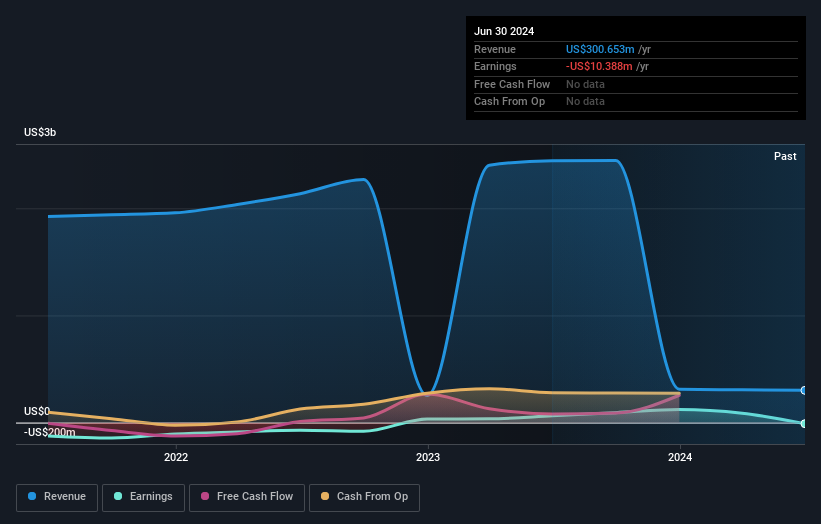Insiders the biggest winners as Vitro, S.A.B. de C.V.'s (BMV:VITROA) market cap rises to Mex$4.1b

Key Insights
- Vitro. de's significant insider ownership suggests inherent interests in company's expansion
- The top 3 shareholders own 64% of the company
- Ownership research, combined with past performance data can help provide a good understanding of opportunities in a stock
A look at the shareholders of Vitro, S.A.B. de C.V. (BMV:VITROA) can tell us which group is most powerful. And the group that holds the biggest piece of the pie are individual insiders with 72% ownership. Put another way, the group faces the maximum upside potential (or downside risk).
Clearly, insiders benefitted the most after the company's market cap rose by Mex$729m last week.
Let's delve deeper into each type of owner of Vitro. de, beginning with the chart below.
See our latest analysis for Vitro. de

What Does The Lack Of Institutional Ownership Tell Us About Vitro. de?
Institutional investors often avoid companies that are too small, too illiquid or too risky for their tastes. But it's unusual to see larger companies without any institutional investors.
There are multiple explanations for why institutions don't own a stock. The most common is that the company is too small relative to funds under management, so the institution does not bother to look closely at the company. On the other hand, it's always possible that professional investors are avoiding a company because they don't think it's the best place for their money. Institutional investors may not find the historic growth of the business impressive, or there might be other factors at play. You can see the past revenue performance of Vitro. de, for yourself, below.

Vitro. de is not owned by hedge funds. David Martinez Guzman is currently the company's largest shareholder with 22% of shares outstanding. In comparison, the second and third largest shareholders hold about 21% and 21% of the stock. Adrian Sada Cueva, who is the third-largest shareholder, also happens to hold the title of Chairman of the Board.
After doing some more digging, we found that the top 3 shareholders collectively control more than half of the company's shares, implying that they have considerable power to influence the company's decisions.
Researching institutional ownership is a good way to gauge and filter a stock's expected performance. The same can be achieved by studying analyst sentiments. As far as we can tell there isn't analyst coverage of the company, so it is probably flying under the radar.
Insider Ownership Of Vitro. de
The definition of an insider can differ slightly between different countries, but members of the board of directors always count. Company management run the business, but the CEO will answer to the board, even if he or she is a member of it.
I generally consider insider ownership to be a good thing. However, on some occasions it makes it more difficult for other shareholders to hold the board accountable for decisions.
It seems that insiders own more than half the Vitro, S.A.B. de C.V. stock. This gives them a lot of power. That means they own Mex$3.0b worth of shares in the Mex$4.1b company. That's quite meaningful. Most would be pleased to see the board is investing alongside them. You may wish todiscover (for free) if they have been buying or selling.
General Public Ownership
The general public-- including retail investors -- own 27% stake in the company, and hence can't easily be ignored. While this size of ownership may not be enough to sway a policy decision in their favour, they can still make a collective impact on company policies.
Next Steps:
I find it very interesting to look at who exactly owns a company. But to truly gain insight, we need to consider other information, too. Case in point: We've spotted 3 warning signs for Vitro. de you should be aware of, and 1 of them is significant.
If you would prefer check out another company -- one with potentially superior financials -- then do not miss this free list of interesting companies, backed by strong financial data.
NB: Figures in this article are calculated using data from the last twelve months, which refer to the 12-month period ending on the last date of the month the financial statement is dated. This may not be consistent with full year annual report figures.
New: Manage All Your Stock Portfolios in One Place
We've created the ultimate portfolio companion for stock investors, and it's free.
• Connect an unlimited number of Portfolios and see your total in one currency
• Be alerted to new Warning Signs or Risks via email or mobile
• Track the Fair Value of your stocks
Have feedback on this article? Concerned about the content? Get in touch with us directly. Alternatively, email editorial-team (at) simplywallst.com.
This article by Simply Wall St is general in nature. We provide commentary based on historical data and analyst forecasts only using an unbiased methodology and our articles are not intended to be financial advice. It does not constitute a recommendation to buy or sell any stock, and does not take account of your objectives, or your financial situation. We aim to bring you long-term focused analysis driven by fundamental data. Note that our analysis may not factor in the latest price-sensitive company announcements or qualitative material. Simply Wall St has no position in any stocks mentioned.
About BMV:VITRO A
Vitro. de
Through its subsidiaries, manufactures, processes, distributes, and sells glass products worldwide.
Flawless balance sheet and fair value.
Similar Companies
Market Insights
Community Narratives


